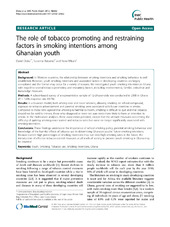| dc.description.abstract | Background: In Western countries, the relationship between smoking intentions and smoking behaviour is well established. However, youth smoking intentions and associated factors in developing countries are largely unexplored and the former may occur for a variety of reasons. We investigated youth smoking intentions in Ghana with regard to several tobacco promoting and restraining factors, including environmental, familial, attitudinal and knowledge measures. Methods: A school-based survey of a representative sample of 12-20-year-olds was conducted in 2008 in Ghana (N = 1338, response rate 89.7%). Results: In a bivariate model, both among ever and never smokers, allowing smoking on school compound, exposure to tobacco advertisement and parental smoking were associated with future intention to smoke. Compared to those who agreed that smoking is harmful to health, smoking is difficult to quit and that tobacco should not be sold to minors, those who disagreed or were not sure were more likely to have an intention to smoke. In the multivariate analyses, these associations persisted, except that the attitude measures concerning the difficulty of quitting smoking once started and tobacco sales ban were no longer significantly associated with smoking intentions. Conclusions: These findings underscore the importance of school smoking policy, parental smoking behaviour and knowledge of the harmful effects of tobacco use in determining Ghanaian youths’ future smoking intentions. Because current high percentages of smoking intentions may turn into high smoking rates in the future, the introduction of effective tobacco control measures at all levels of society to prevent youth smoking in Ghana may be essential. | en_US |

